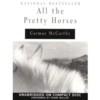

All the Pretty Horses, by Cormac McCarthy, Read by Frank Muller, HarperAudio, 2000
Read by Brad Pitt, Random House Audio, 2000
It has been said unto death that there are no new stories, that every author must merely plow the same already deeply furrowed soil previous writers have been turning over for centuries. It is a measure of how deeply true this is that even noting the truism itself has a near-ancient pedigree. The best of creators chooses wisely from among the well-told tales, the shop-worn characters, the familiar themes, and adds to them the novelty of perspective, the single unique ingredient, fashioning what is both new and customary.
Cormac McCarthy not only builds the first volume of his Border Trilogy, All the Pretty Horses, out of such timeless tales as the quest and coming of age, he also populates it with more recent stock characters and scenarios, yet still manages to create brilliant art. Within the horse opera framework, itself a genre thoroughly mangled in the public imagination by its lesser, pulpier practitioners, McCarthy provides us with the loner whose quiet excellence in his field could bring him fame if he cared for more than The Dream; the youth matured beyond his years who still must learn one more lesson; the taciturn, stone-faced cowboy; the rancher with the beautiful, likely unattainable daughter; the corrupt Mexican official and brutal Mexican prison; and the quick-shot, hotheaded youth in Billy the Kid mold. It is a testament to McCarthy’s considerable skill that only the character of Jimmy Blevins, the catalyzing fourteen year old sharpshooter, has even the remotest hint of exaggeration or inauthenticity about it.
In 1948, his father dying of cancer, his estranged mother pursuing a career on the stage and selling off the family’s Texas ranch and land, sixteen year old John Grady Cole rides off with his friend Lacey Rawlins across the border into Mexico. Their goal of finding a ranch on which to work aims at striving for a purer past by leaving America just as the automobile is about to conquer the open country in life altering quantity. Mexico, with its slower changing, vast agrarian spaces presents itself as the most obvious destination, and before they even cross the border another fugitive, the pistol-packing boy Blevins whose actions will nearly destroy both John Grady and Rawlins before the book’s conclusion, joins them. In the border state of Coahuila, Grady and Rawlins find work at the Hacienda de Nuestra Señora de la Purísima Concepción, where Grady begins and ends his doomed romance with the rancher’s beautiful daughter Alejandra. The actions of Blevins in retrieving his horse and pistol eventually get the heroes arrested, thrown into a Mexican prison, from which they are eventually freed before they return home.
Following the best quest style, the novel is episodic, though we never really quite know what it is John Grady and Rawlins are after until they get there. Their precise goal is never discussed by either the third person narration or by themselves, though it is clear from what precedes their ride that horses will be intrinsic in this choice beyond merely a means of transportation. While both men are skilled in their horsemanship, it is clear that John Grady is the better of the two, a sympathy with the animals that has in some real sense divorced him from the more commonplace concerns of his fellow humans. John Grady is almost preternaturally calm, patient, broad-minded while substantial evidence suggests that it is in part an almost adopted stance, a guise the youth is trying to shuck in order to actually become the mask, to transcend playacting at being a man and to actually become him.
Within its episodic framework, McCarthy tells a story that carries its own death within it, in the elegiac prose, in the notions of ranching and horse culture dying out in America, and with the frequent reference to pistols and rifles. It was Chekhov who wrote that a pistol introduced on stage must be fired before the play’s conclusion, and in the context of a Western it is only a matter of time before one or more prevalent firearm is emptied into someone. Likewise, any death-story that engages in matters of the heart must likewise sunder such romantic dalliances before its conclusion. All ties must be severed, everything must be lost.
It becomes quite obvious listening to the book that part of what we are seeking in quests is the breaking of our own hearts in order that, like the healed place of a broken bone, it will become stronger in the broken place. Is this what we learn on our journeys? That the world is a hard place, that pain is our human lot, that no one is immune from suffering? Those who have been on quests know a lesson only others who have done the same know: that to seek out the goal, whatever it may pose as, is to seek out death, it is to break your own heart in dancing with your death, in order to fully grasp your life and future. You must face down death, your imagined, your dreamed death, you must move toward that death in order to better move away from it, to conquer it or be conquered.
But in a sense, death is always the winner in a quest contest. The old you dies to make way for the new you; a quest is a movement toward the death of what came before, a search for one’s new life, new identity; it itself is a kind of coming of age, a harrowing that clearly, if not always cleanly, separates your life into two unequal epochs. It is measured not in terms of years but in how thoroughly your previous persona is eradicated, how transformed you are, and how deeply down into the pool of solitude and silence you were forced.
McCarthy’s spare dialogue demonstrates the profundity of John Grady’s seeking of these depths, while his characterization of setting is both lush and quasi-Biblical in its evocations. It is one of the novel’s great strengths, McCarthy’s ear for dialogue and how he captures personality in the best show-don’t-tell fashion, yet without the novel’s transforming and transfigurative language, All the Pretty Horses would be merely another, better written western. Consider this passage near the novel’s conclusion that encapsulates religiosity, feelings of loss, tenderness, and the existential torment of a world that refuses to shape itself to our wishes:
He stood hat in hand over the unmarked earth. This woman who had worked for his family fifty years. She had cared for his mother as a baby and she had worked for his family long before his mother was born and she had known and cared for the wild Grady boys who were his mother’s uncles and who had all died so long ago and he stood holding his hat and he called her his abuela and he said goodbye to her in spanish and then turned and put on his hat and turned his wet face to the wind and for a moment he held out his hands as if to steady himself or as if to bless the ground there or perhaps as if to slow the world that was rushing away and seemed to care nothing for the old or the young or rich or poor or dark or pale or he or she. Nothing for their struggles, nothing for their names. Nothing for the living or the dead.
For means of comparison, I listened to first the unabridged version and then the abridged version, curious as to how abridgements were approached. Abridged books are, in one sense, truly worthless, as they consist merely of plot highlights. That was completely the case in this situation. Readers of abridged books are not readers in the sense of wanting to immerse themselves in a created world, but story junkies who just want their next fix of bloodcurdling event. There are probably few books of little plot and much atmosphere that are ever bothered by the abridgement brigade. A list of abridged novels by Reader's Digest is a simple example, most books being mostly plot driven devices at any rate. For the serious reader, abridged versions could only have value as a refresher when time pressed and you need to make conversation at a party. It’s like hearing a snatch of a song to remind you of the whole album.
Muller does all the characters beautifully and reads in a dreamy voice just a bit slower than his usual pace, as if savoring the language and wishing you to join him in it. He takes his cues deeply from McCarthy’s dialogue spellings and each voice is instantly recognizable and memorable. His Spanish dialogue and Mexican characters sound effortlessly obtained with none of the forced hissiness and stupidity many gringo readers foist on our southern neighbors.
Pity poor pretty boy Brad Pitt who has to not only go up against one of, if not the, finest readers of audiobooks, but also has to read the abridged version, the gelded McCarthy. He makes little to no effort at characterization (which seems desperately poor when we’re dealing with Texans and Mexicans) save for the occasional variation in volume for some characters or moments of drama. His best reading is in the more comic elements of the Jimmy Blevins story in the beginning, reinforcing my long-held opinion that Pitt is a talented comic actor cursed by a physical beauty that suggests high drama — a milieu for which he is solely untalented. It’s a curious thing to have him read the book, as he was not involved in the movie or the book in any fashion whatsoever.
The Pitt abridgement had one strength over Muller’s and that was in its tracking. HarperAudio chose the odd and damnable decision to track the reading along mysterious rules parallel to no reason. Disc one was tracked into twelve five-minute tracks, disc two was one long 55-minute track, and subsequent discs made up a middle ground of track length. The people at Random House gave us easily maneuvered three-to-five minute bursts of narration and a sweet little guitar piece at the work’s beginning and end.
The destruction of a novel that abridgement brings with it was no more clearly shown in both versions than in one of the early scenes of John Grady and Rawlins at the Hacienda. They have chosen to break sixteen wild horses culled from the herd on the ranch’s mountains. McCarthy provides a long, detailed description of John Grady’s horse genius, using horse whisperer techniques, tying the horse’s rear leg to the head to semi-hobble it, speaking to the horses, calming them, “stroking the terror out.” In the truncated version, we are given no more than a cowboy John who hops off the fence into the pen, rides some horses, and by nightfall they were broken. This invokes the more common images associated with the phrase “breaking horses” and the portrait of Grady is both a crude and childishly drawn cowpuncher. We have almost no reason to believe in this man, no reason to concern ourselves with who he is or who he is becoming. He is a nobody, a zero, not even a cipher. Abridging novels ultimately sucks all soul out of the work — and nowhere is that more unforgivable than in a novel that concerns itself with nothing so much as the expanding of the soul into transcendence.
No comments:
Post a Comment